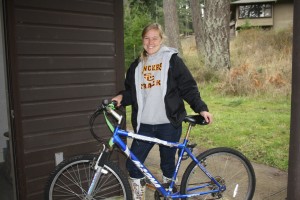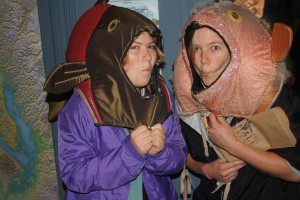One World
After an amazing two weeks Spring break travelling from coast to coast, I have finally made it to the idyllic Friday Harbor Labs in the San Juan Islands. It is difficult to give the place justice through words alone. I feel so fortunate to be living for the next ten weeks in a place where tiny evergreen islands litter the sea and snow capped mountains touch the lapping waters. How can anyone be expected to study in such a gorgeous environment full of distraction? I feel I constantly want to be outside exploring! In some respects the area reminds me of Maine, however, on a more dramatic scale. Since meeting the other Beam Reachers, in Seattle little under a week ago, we have embarked on numerous adventures together. It is so great to be surrounded by like-minded students who share a passion for conservation and the environment. If you wander past the ‘S1 duplex’, regardless of time of day, one can expect to hear music playing and the sounds of laughter in the air.  Yes, there has been lots of laughter! It has also been great integrating with the other students and researchers at the lab. Hearing about their work, I would argue that the quality and diversity of the research generated at the lab is astonishing.
As a class, it feels that we have already learnt so much; way more than I could have envisioned at the start of the week. So far, we have covered basic whale biology, killer whale family structure, population trends, and even dipped in to whale genealogy. In addition to the marine mammal component of this ten week intensive course, we are also learning the methods of practicing sustainability science. But what does this involve? After numerous discussions, both inside and outside of the class room, it has become evident that the scope of ‘sustainability science’ is broad, and the definition specific to each individual. Throughout the week, having grappled with some case studies and current literature, I have found my own personal definition to have evolved. At the moment, I would describe it as an interdisciplinary approach to science that takes into consideration local and global perspectives, whilst remaining conscious of environmental, social and economic factors. Through innovation, education, and the evaluation of current practices we can both mitigate and minimize our footprint on both a regional and global scale. Because this is still a working definition, my hope is to revisit and reference it throughout the quarter. I would encourage any readers to pause for a moment and think of their own definition. I would also like to draw the reader’s attention to RE-sources; a local organization run from Belligham, WA. (http://www.re-sources.org/home). Katie Fleming, a RE-source community outreach manager, came in to draw our attention to local sustainability science issues, and the things we [students] can do to get involved. I was particularly impressed by the examples she gave that highlighted various methods, such as workshops and citizen training, used by RE-source to empower local communities.  Hearing the perspectives of an outside source has been insightful. In addition to Katie Fleming, Lynne Barre from NOAA came in to give an overview of Southern Resident Recovery.
Given the success of the first week, I can’t wait to find out what next week has in store for us!





 Twitter
Twitter LinkedIn
LinkedIn Facebook
Facebook